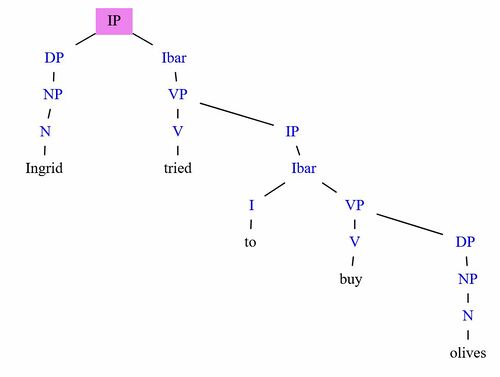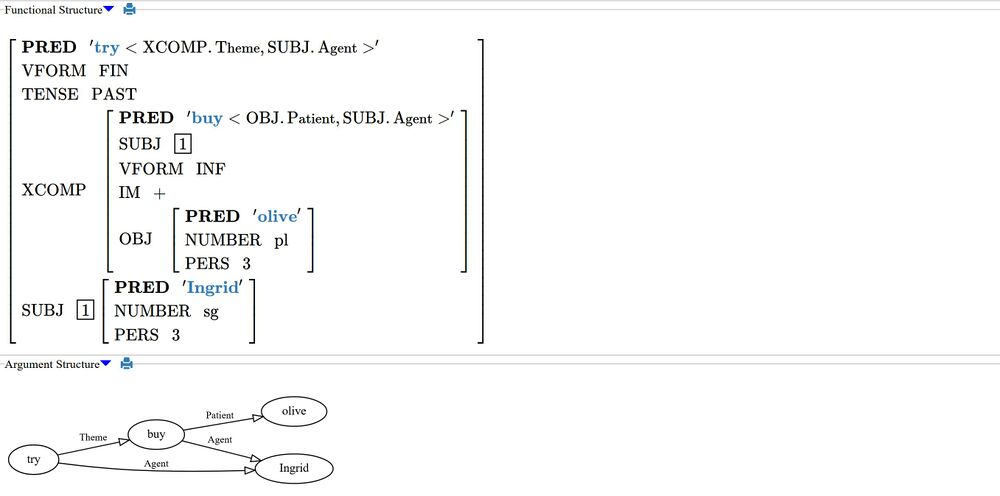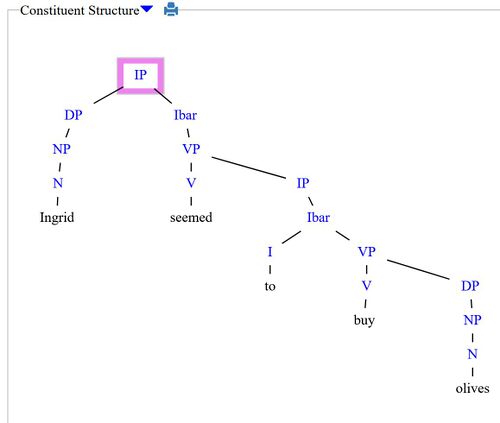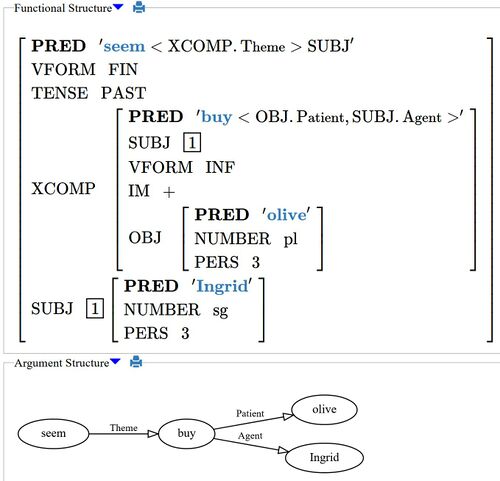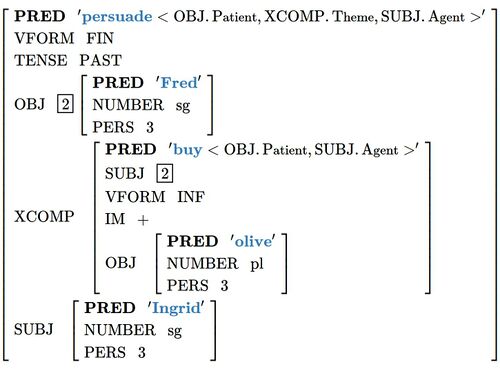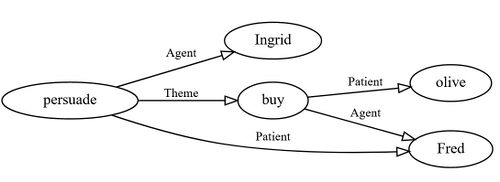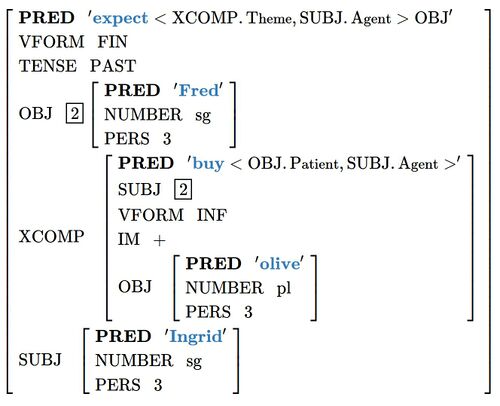Practical Grammar 9: Difference between revisions
No edit summary |
|||
| (33 intermediate revisions by the same user not shown) | |||
| Line 36: | Line 36: | ||
<span style="color: blue>Exercise 9.1 </span> | <span style="color: blue>Exercise 9.1 </span> | ||
* Go to <span class="newwin">[https://xlfg.labri.fr/ https://xlfg.labri.fr/]</span>. | * Go to <span class="newwin">[https://xlfg.labri.fr/ https://xlfg.labri.fr/]</span>. | ||
* Extend your lastest grammar or make yourself a copy of Grammar5-Ex8.2-solution. | <!-- * Extend your lastest grammar or make yourself a copy of Grammar5-Ex8.2-solution. --> | ||
* On the basis of pages 102-103 in the textbook, make all the additions to the grammar that are necessary to yield the following outputs for sentence (1): | * On the basis of pages 102-103 in the textbook, make all the additions to the grammar that are necessary to yield the following outputs for sentence (1): | ||
(1) Ingrid tried to buy olives. | (1) Ingrid tried to buy olives. | ||
[[File:Ingrid-tried-to-buy-olives-cs.JPG | 500px]] | [[File:Ingrid-tried-to-buy-olives-cs.JPG | 500px]] <br> | ||
[[File:Ingrid-tried-to-buy-olives-fs.JPG | | [[File:Ingrid-tried-to-buy-olives-fs.JPG | 1000px]] | ||
<br> | <br> | ||
| Line 59: | Line 59: | ||
Notation: | Notation: | ||
The verb ''seem'' | The verb ''seem'' differs from the verb ''try'' in that ''seem'' does not assign a semantic role to its SUBJ. This is the first time we encounter such verbs. In XLFG, GFs that the predicate does not assign a role to are written between the closing > and the final apostrophe, as follows: | ||
* PRED:'X<...>Y' | * PRED:'X<...><span style="color: red>Y</span>' | ||
Meaning of the line above: the GFs listed in ... are assigned semantic roles by the predicate, but the grammatical function Y is not. | Meaning of the line above: the GFs listed in ... are assigned semantic roles by the predicate, but the grammatical function <span style="color: red>Y</span> is not. | ||
<span style="color: blue>Exercise 9.2 </span> | <span style="color: blue>Exercise 9.2 </span> | ||
| Line 79: | Line 79: | ||
==''persuade (Object control verb)''== | ==''persuade (Object control verb)''== | ||
''try'' and ''seem'' are subject control (raising verbs), because the controller of the lower subject is the higher subject. But, objects can control as well. One verb where that is the case is ''persuade''. | ''try'' and ''seem'' are subject control (raising verbs), because the controller of the lower subject is the higher '''subject'''. But, objects can control as well. One verb where that is the case is ''persuade''. | ||
<span style="color: blue>Exercise 9.3 </span> | <span style="color: blue>Exercise 9.3 </span> | ||
| Line 87: | Line 87: | ||
(5) Ingrid persuaded Fred to buy olives. | (5) Ingrid persuaded Fred to buy olives. | ||
[[File:Ingrid-persuaded-to-buy-olives | [[File:Ingrid-persuaded-Fred-to-buy-olives.cs.JPG | 1000px]] | ||
[[File:Ingrid-persuaded-to-buy-olives- | [[File:Ingrid-persuaded-Fred-to-buy-olives.fs.JPG | 500px]] | ||
[[File:Ingrid-persuaded-Fred-to-buy-olives-as.JPG | 500px]] | |||
<br> | <br> | ||
| Line 94: | Line 95: | ||
(2) Ingrid buys olives <br> | (2) Ingrid buys olives <br> | ||
(3) *Ingrid | (3) *Ingrid persuaded Fred buys olives | ||
==''expect(Object raising verb)''== | ==''expect(Object raising verb)''== | ||
''expect'' is an object raising verb. | ''expect'' is an object raising verb. | ||
<span style="color: blue>Exercise 9.4 </span> | |||
Make all the changes to your current grammar so that it licenses the representations below: | Make all the changes to your current grammar so that it licenses the representations below: | ||
| Line 104: | Line 107: | ||
(5) Ingrid expected Fred to buy olives. | (5) Ingrid expected Fred to buy olives. | ||
[[File:Ingrid-expected-to-buy-olives-cs.JPG | | [[File:Ingrid-expected-Fred-to-buy-olives-cs.JPG | 1000px]] | ||
[[File:Ingrid-expected-to-buy-olives-fs.JPG | 500px]] | [[File:Ingrid-expected-Fred-to-buy-olives-fs.JPG | 500px]] | ||
[[File:Ingrid-expected-Fred-to-buy-olives-as.JPG | 500px]] | |||
<br> | <br> | ||
| Line 123: | Line 127: | ||
<br> | <br> | ||
<font face="Arial, Helvetica, sans-serif"> | <font face="Arial, Helvetica, sans-serif"> | ||
<font size=" | <font size="2"> | ||
<div align="center"> | <div align="center"> | ||
[[Practical_Grammar |'''Main page''']] [[Practical_Grammar_2|'''Week 2''']] [[Practical_Grammar_3|'''Week 3''']] [[Practical_Grammar_4|'''Week 4''']] [[Practical_Grammar_5|'''Week 5''']] [[Practical_Grammar_6|'''Week 6''']] [[ | [[Practical_Grammar |'''Main page''']] [[Practical_Grammar_2|'''Week 2''']] [[Practical_Grammar_3|'''Week 3''']] [[Practical_Grammar_4|'''Week 4''']] [[Practical_Grammar_5|'''Week 5''']] [[Practical_Grammar_6|'''Week 6''']] [[Practical_Grammar_7_new|'''Week 7''']] [[Practical_Grammar_8|'''Week 8''']] '''Week 9''' | ||
</div> | </div> | ||
<!-- [[Practical_Grammar_10|'''Week 10''']] [[Practical_Grammar_11|'''Week 11''']] [[Practical_Grammar_12|'''Term Paper Project''']] --> | |||
Revision as of 08:42, 10 July 2023
Functional Control
In this unit, we will extend the grammar to license sentences with verbs like 'try' and 'seems' which have interesting properties.
try (Control verb)
Notation:
In the exercises of this unit, we will have to implement Control: this means that a GF of the higher verb and the SUBJ of the higher verb's XCOMP are identical.
In XLFG, this is written as follows:
- (↑SUBJ) = (↑XCOMP SUBJ); means: the SUBJ of the higher verb and the XCOMP's SUBJ are identical.
- (↑OBJ) = (↑XCOMP SUBJ); means: the OBJ of the higher verb and the XCOMP's SUBJ are identical.
Exercise 9.1
- Go to https://xlfg.labri.fr/.
- On the basis of pages 102-103 in the textbook, make all the additions to the grammar that are necessary to yield the following outputs for sentence (1):
(1) Ingrid tried to buy olives.
Implement the following grammatical assumptions:
- 'to' (the infinitive marker): assume that it is marked [IM:+].
- 'buy': [VFORM:INF]
Make sure that your grammar makes the correct predictions for the sentences below:
(2) Ingrid buys olives
(3) *Ingrid tried buys olives
seem (Raising verb)
Notation:
The verb seem differs from the verb try in that seem does not assign a semantic role to its SUBJ. This is the first time we encounter such verbs. In XLFG, GFs that the predicate does not assign a role to are written between the closing > and the final apostrophe, as follows:
- PRED:'X<...>Y'
Meaning of the line above: the GFs listed in ... are assigned semantic roles by the predicate, but the grammatical function Y is not.
Exercise 9.2
- Go to https://xlfg.labri.fr/.
- Make sure that under 'Output Parameters' Extended Coherence test on Feature-Structures is set to Yes.
- Extend your previous grammar.
- On the basis of pages 104-108 in the textbook, make all the additions to the grammar that are necessary to yield the following outputs for sentence (4):
(4) Ingrid seemed to buy olives.
persuade (Object control verb)
try and seem are subject control (raising verbs), because the controller of the lower subject is the higher subject. But, objects can control as well. One verb where that is the case is persuade.
Exercise 9.3
Make all the changes to your current grammar so that it licenses the representations below:
(5) Ingrid persuaded Fred to buy olives.
Make sure that your grammar makes the correct predictions for the sentences below:
(2) Ingrid buys olives
(3) *Ingrid persuaded Fred buys olives
expect(Object raising verb)
expect is an object raising verb.
Exercise 9.4
Make all the changes to your current grammar so that it licenses the representations below:
(5) Ingrid expected Fred to buy olives.
